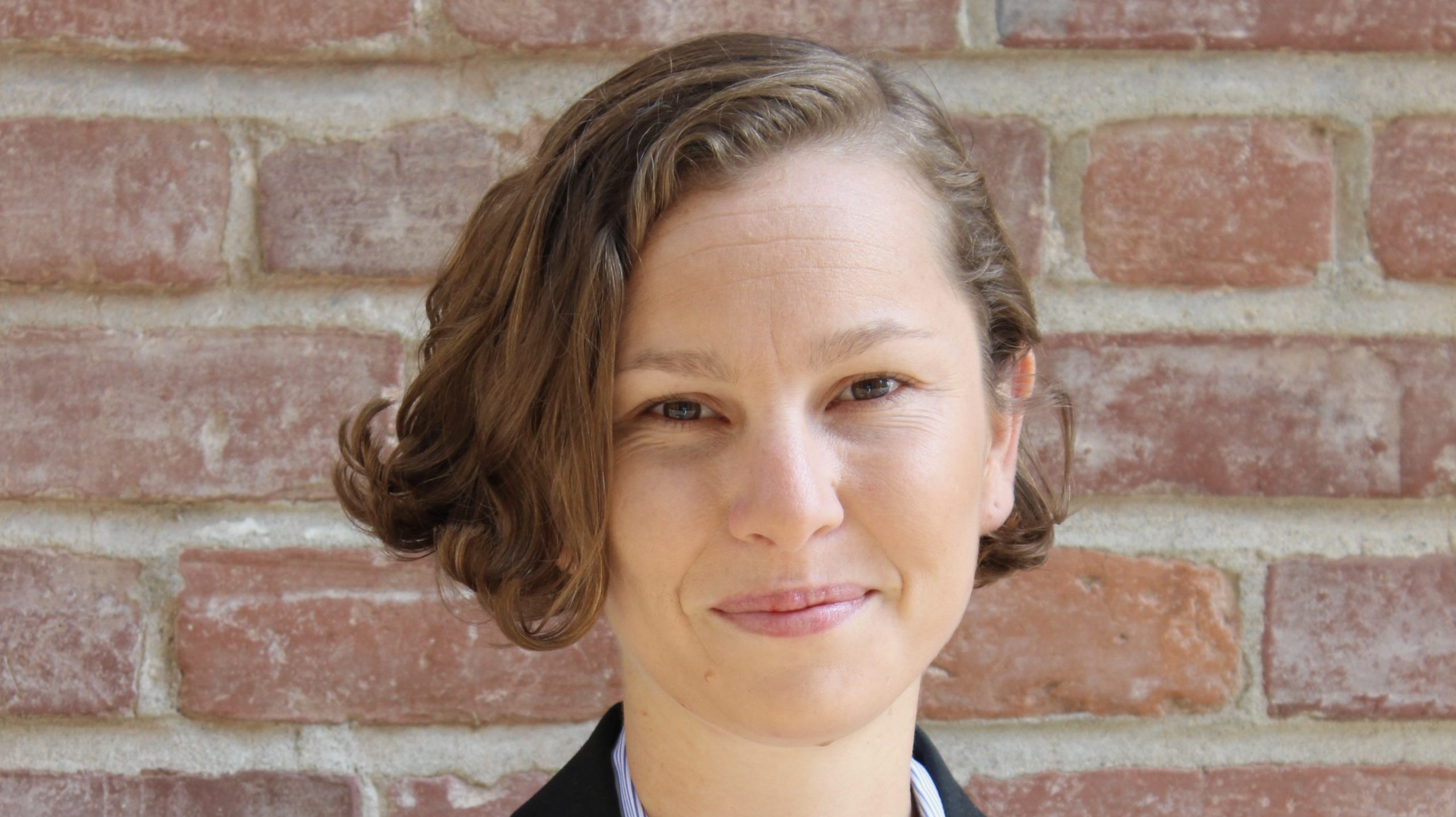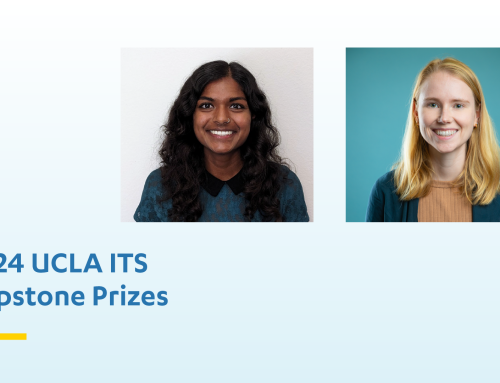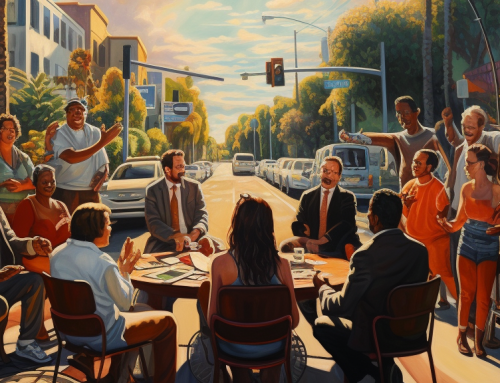Soon after joining the UCLA Institute of Transportation Studies in the fall as a postdoctoral scholar, Amy Lee received a national award for her recently completed dissertation on the politics of highway expansions. Lee received the 2023 Charley V. Wootan Memorial Award from the Council of University Transportation Centers for the best doctoral dissertation in the field of transportation policy and planning.
As a doctoral student at UC Davis, Lee studied a range of topics related to transportation policy and governance in California, specifically the continued investments in highway construction and expansion despite the state’s clear goals to mitigate climate change and air pollution. Her comparative analysis of regional transportation plans and programming determined that auto infrastructure received the most funding in four of the five metropolitan regions studied. Plus, she found agencies’ near-term spending plans were more likely to include auto-centric projects than their long-range regional plans.
Through interviews and case studies, Lee discovered that traffic congestion, land development, goods movement, and job creation are the main drivers of highway expansion in the state. She found that local and district-level institutions prioritize differently from state ones, favoring short-term problems and solutions over long-term concerns like climate change.
At UCLA, Lee will continue to research policy solutions and decision-making in California. This time, the focus will be on parking.
The following Q&A with Amy Lee has been edited for length and clarity.
How did you come to focus your research on highway expansions?
It came out of years of exploration and thinking about all of the momentum, laws, and guidance that California has for climate change, air quality, and environmental justice. I wanted to better understand why we as a state continue to make decisions that contradict all of our goals in these policy areas.
A huge part of transportation spending has long been dedicated to highway-building and expansion. I was interested in studying how such a big aspect of the transportation arena could go unquestioned and become common sense. And I’m not the first to question it, by any means. These impacts have been understood in science and academia for decades, so why has our policy and planning continued to operate this way? That was the question I set out to answer.
Is there anything specific that contributed to your success as a PhD candidate?
I was fortunate to have a phenomenal advisor in Dr. Susan Handy, who pushed me to explore bold research questions and encouraged me to think outside the box when designing my dissertation. I give her a ton of credit in terms of both intellectual support and my work as a PhD candidate. My colleagues and fellow doctoral students were also always super supportive.
I worked at the Sacramento Area Council of Governments for six years before starting my PhD, and that practical experience was very formative. I worked between the Modeling and Policy teams and looked into how we could be using data to improve decision-making. I ultimately saw some decisions being made because they were the status quo rather than being informed by our cutting-edge data and research. This sparked my interest in why we do what we do as a field, because it is often not for a lack of research, modeling, or analytical capacity. This experience also helped inform my research methods. I went into more political science and “policy process” for my dissertation, rather than taking a more analytical and quantitative approach.
What are you working on as a postdoctoral scholar at UCLA?
California Assemblymember Laura Friedman introduced AB 2097, which proposed statewide reform to parking policy and was passed around a year and a half ago by the California Legislature. It prohibits cities from enforcing minimum parking requirements in developments within a half-mile of public transit, to focus on housing affordability and the connection between transit and land use. My research is focused on evaluating this statewide policy.
I’m looking at how the bill is being implemented by local governments: What guidance has been issued? Have they embraced the letter or spirit of the law? I am also working on evaluating its impacts: How has the bill affected the amount of parking supplied by new development projects? I’ll also be digging into the process of getting that bill passed by the Legislature — the coalitions involved, supporters and opponents, what motivated them, et cetera. A lot of the research that went into the drafting of AB 2097 came from UCLA ITS scholars, which makes it even more exciting to work here.
How did your research focus shift from freeway expansions to parking policy?
I see a pretty natural progression between the two. I previously studied highways, which are expensive auto-oriented infrastructure with high opportunity costs. Parking is also high-cost auto-oriented infrastructure.
I’ll still be looking into why we implement the policies we do, but focused on another very relevant and important part of the transportation system that relates to air quality, climate change, and equity. I’m very excited to do parking and policy research at UCLA with its rockstar faculty. There is a wealth of knowledge they can share when it comes to parking.
Do you have any specific goals for your time as a postdoctoral scholar?
I have many goals! The biggest one would be collaborating as much as possible with the folks at UCLA ITS and contributing to its body of research. There are brilliant researchers here who think about transportation and planning questions in such interesting ways. I have been enjoying getting to know everyone here and have been warmly welcomed into the team.
What are some of the biggest changes you’ve seen or experienced in moving from Davis to L.A.?
L.A. contains multitudes. It’s a seemingly infinite city. Its food scene is unparalleled — it puts Davis to shame — and I’m looking forward to exploring it more fully.
The sheer scale of the auto network in L.A. was surprising to me even though I’ve heard about it forever. I’m getting around exclusively by transit here and navigating the city by bus is highly educational for someone in this field.
One thing that’s clear is that L.A. did not put bikeability at the forefront of its land use and transportation decisions, while Davis did. I think there is great potential for bikeability in L.A. — great weather, relatively flat, plenty of street space — but you can see that policy choices were based on automobility. Things like that have been very clear to me as someone who cares about creating more easy and, frankly, joyful ways to get around our communities.
There are also things I’m really excited about doing in L.A. I can’t wait to go to an Angel City FC game and, of course, watch UCLA women’s soccer and basketball games.
How can someone who is interested in your work get in touch with you?
Feel free to email me! I am always happy to discuss my research or talk to anyone who is interested in graduate school, or who is trying to decide between graduate school and professional planning, or anything in that area.





